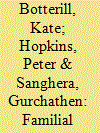| Srl | Item |
| 1 |
ID:
175328


|
|
|
|
|
| Summary/Abstract |
This paper discusses the family as a site of geopolitics. Bridging scholarship in feminist geopolitics, political psychology and sociology, we explore the psycho-social dynamics of family life and theorise the family as a multi-scalar, relational site of security. Original data collected with ethnic and religious minority youth in Scotland are presented alongside an analysis of how family relations, at interconnected scales, mitigate against and/or re-inscribe broad geopolitical narratives of security. We employ the concept of ontological security (OS) to analyse the role of the family, and the relationships within it, on shaping youth securities. We discuss (1) how family histories and intergenerational experience shape young people’s sense of security; (2) how young people negotiate and resist family norms and values that reproduce securitizing geopolitical narratives; and (3) how young people find security when family is absent or indeterminate. In each case, we analyse how geopolitics operates through family life. The paper makes two key contributions: first, we use original empirical data to theorise ethnic and religious minority youth securities; second, we show the value of OS as a conceptual tool for understanding psycho-social dimensions of familial geopolitics.
|
|
|
|
|
|
|
|
|
|
|
|
|
|
|
|
| 2 |
ID:
092126


|
|
|
|
|
| Publication |
2009.
|
| Summary/Abstract |
Despite a growth in social studies of peacekeeping, there has been little written on field experiences in such contexts. This article examines the role of the researcher in influencing the research process and product in two peacekeeping sites, Liberia and Kosovo. Although researchers are often positioned in powerful ways vis--vis researchees, the multiplicity and complexity of their positionality are often overlooked. By drawing on examples from team research conducted, the article suggests that these positionings give rise to unconventional and contradictory power relations. By reflecting on the role of the researcher(s) and the politics of research itself, we hope to engender more conscientious peacekeeping research.
|
|
|
|
|
|
|
|
|
|
|
|
|
|
|
|